Posts by Christopher Lochhead
235 Moby’s Different Life, Extreme Ways, and New Little Pine Cookbook
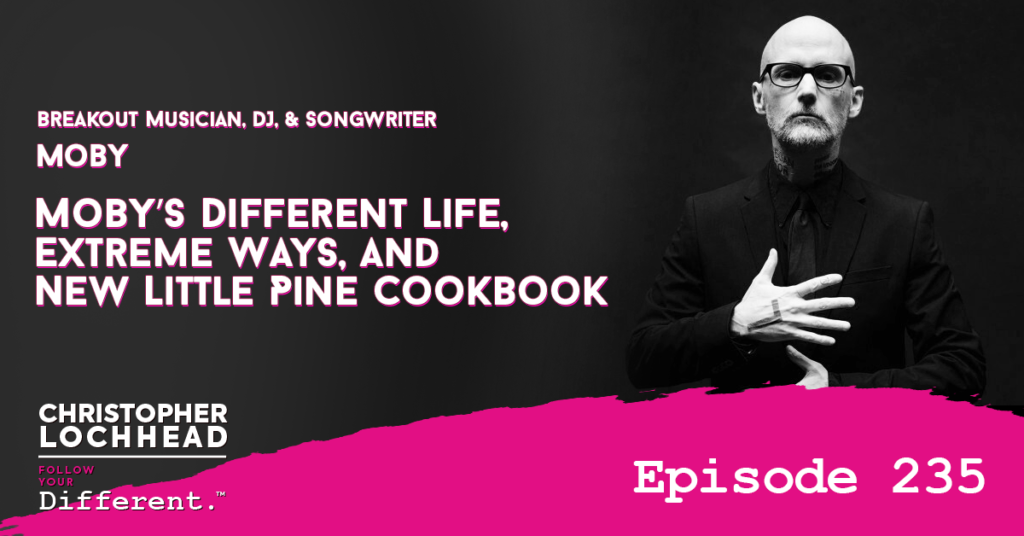
Podcast: Play in new window | Download (Duration: 1:06:40 — 45.8MB) | Embed
Subscribe: Apple Podcasts | Spotify | Pandora | RSS | More
If you’re a long-time listener, you know that we do not have many celebrities as guests on Follow Your Different. We take a pass on most of them because frankly, they’re not that interesting. However, Moby is not your typical celebrity or Hollywood type.
Moby is a breakout musician, DJ, and songwriter. He’s sold over 20 million records worldwide, and he is credited with helping to bring electronic dance music to a mainstream global audience. He is also an animal advocate and a deeply-committed vegan, and he’s got a brand-new cookbook out. It’s called Little Pine Cookbook, which is based on the recipes of Little Pine, a restaurant that he had founded.
What you’re about to hear is a real dialogue like none other: from Moby’s tough start in life, to making and breaking it and having it all fall apart, then building yourself back again. You’ll also hear stories on Moby meeting his heroes, including what it was like to hang out with none other than David Bowie.
Moby on Meeting Your Heroes
To Moby, making the cover for David Bowie’s ‘Heroes’ has a personal context. He shares that when he was around 12, he had bought two David Bowie albums. Since then, David Bowie became his favorite musician of all time.
Then in the late 90’s, they became friends. Then neighbors. They even went on tours together, worked on music together, and enjoyed each other’s company.
“We had this one amazing day where he was in my apartment in New York. We played an acoustic version of heroes together. It was such a magical moment that the version of Heroes on Reprise is sort of a tribute to the song; a tribute to the fact that I was friends with my favorite musician of all time, and a tribute to this moment of playing Heroes with the greatest musician of all time.” – Moby
That said, there is a saying that goes, “you should never meet your heroes, because they are sure to disappoint you.” Moby acknowledges that there are times that it is true. Though in David Bowie’s case, it only made him appreciate the person and his music more after meeting him.
Moby on Being a Public Figure
It’s not unusual to look up to icons and dream of one day becoming one. Being famous or a public figure is a dream that a lot of people have. Though according to Moby, being a public figure can be more stressful than it’s worth.
It might sound pretentious or narcissistic coming from a place of having achieved it already, but it is something Moby wishes to share through his book, ‘Then It Fell Apart’. His documentary, Moby Doc, also shines a bit of light into this:
“The idea is that the human condition is one of confusion. You know, as long as we’re human, we’re baffled. So It seems like we all gravitate towards things that give us a sense of meaning, structure, and status. And so the book ‘Then It Fell Apart’ and ‘Moby Doc’ is sort of looking at that. Like how I had my own individual experience of bafflement, and how I tried to find anything that would give me that sense of meaning, purpose, status, comfort, what have you.” – Moby
Living the Rockstar Life
When asked whether he thinks that he’s “living the rockstar life”, Moby thinks that he has lived a life so far that has given him a unique perspective. As someone who has been to the extreme ends of both poverty, wealth, and varying degrees of fame, it has given him an insight that is undenyingly his own.
Yet while the specific details are unique to him alone, the general circumstance is not. That is why Moby felt that he had to share his story. Not so much as to show everyone what he has achieved in his life so far, but as a reference for those who are aspiring for such a lifestyle, or those who might be in a similar situation.
To hear more from Moby and his insights on meeting your heroes and living an accomplished life, download and listen to this episode.
Bio
Richard Melville Hall, known professionally as Moby, is an American musician, songwriter, singer, producer, and animal rights activist. He has sold 20 million records worldwide. AllMusic considers him to be “among the most important dance music figures of the early 1990s, helping bring dance music to a mainstream audience both in the United States and the United Kingdom”.
In addition to his music career, Moby is known for his veganism and support for animal rights and humanitarian aid. He was the owner of TeaNY, a vegan cafe in Manhattan, and Little Pine, a vegan restaurant in Los Angeles, and organized the vegan music and food festival Circle V. He is the author of four books, including a collection of his photography and two memoirs: Porcelain: A Memoir (2016) and Then It Fell Apart (2019).
Links
Follow Moby today!
Website: Moby.com
Instagram: @Moby
Check out Moby’s books:
Listen to Moby’s Latest Album, Reprise
More on Moby:
VegNews: Moby Just Wrote A Vegan Cookbook, And All Proceeds Go To Animal Rescue
We hope you enjoyed this episode of Follow Your Different™! Christopher loves hearing from his listeners. Feel free to email him, connect on Facebook, Twitter, Instagram, and subscribe on iTunes!
124 The Big Brand Lie: How Categories Make Brands & Why Brand Marketers Never Believe It
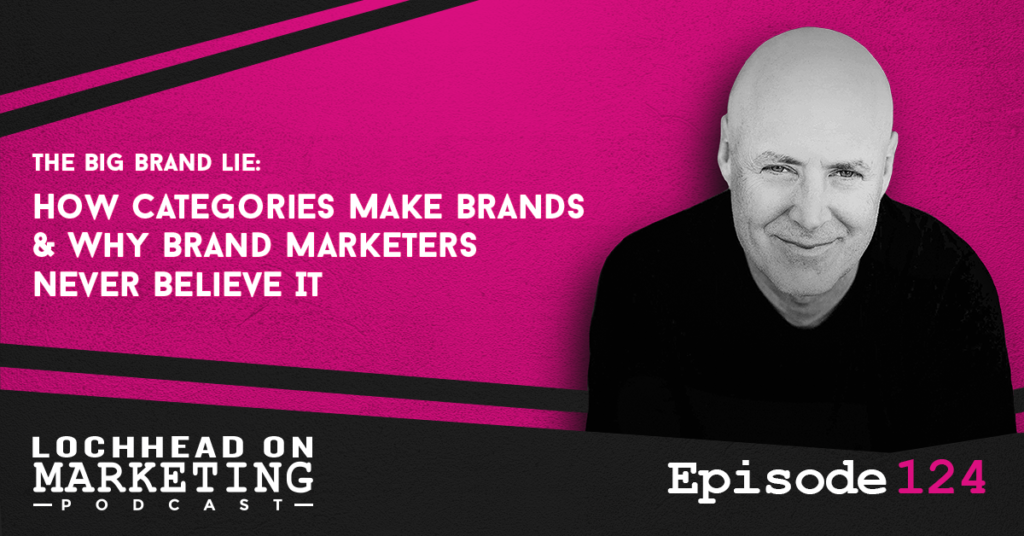
Podcast (lochheadonmarketing): Play in new window | Download (Duration: 46:22 — 31.8MB) | Embed
Subscribe: Apple Podcasts | Spotify | RSS | More
Welcome to a very special episode of Lochhead on Marketing. This episode is based on a recent Category Pirates newsletter that we wrote, which was about Big Brand Marketing and why it doesn’t work.
It is also available as a mini eBook here.
Think of this episode as more of an audiobook than a podcast, as I will be reading the article for you. Without further ado, let’s get to reading.
The Brand Cult
A meaningful percentage of marketers, entrepreneurs, and executives are in what we like to call “The Brand Cult.” They’ve been taught the best (aka: “the most well known”) brand wins.
Even though the data shows this is not true.
- Ford spends $2.5 billion per year on brand advertising, with a market cap of $50 billion. General Motors spends $3 billion, with a market cap of $70 billion. Meanwhile, Tesla spends $0, but has a market cap of $700 billion.
- In 2011, Google spent almost $600 million building and launching a social network to compete with Facebook and Twitter called Google+. If “the best brand wins,” how come Google+ failed? After all, Forbes named Google the 2nd “most valuable brand in the world” in 2020.
- Comcast spends more than $5 billion on branding and advertising each year. And yet, Comcast has long been considered “America’s Most Hated Company.” There’s even a Wikipedia page dedicated to the company’s inadequacies, titled “Criticism of Comcast.” (United Airlines is a close second, if you ask us.) So if branding and “shouting from the rooftops” is the key to winning the game, how come $5 billion per year can’t solve Comcast’s problems? Maybe they need $10 billion?
Though sharing data with a cult member is about the worst thing you can do. That’s because facts are upsetting to feelings—particularly facts that disprove everything you’ve been taught to believe.
Well, here’s a fact:
Categories make brands. Not the other way around.
How The Brand Cult Began
In 2011, The Atlantic published a piece titled, “How Brands Were Born: A Brief History of Modern Marketing.”
“In the 1950s, consumer packaged goods companies like Procter and Gamble, General Foods and Unilever developed the discipline of brand management, or marketing as we know it today, when they noticed the quality levels of products being offered by competitors around them improve. A brand manager would be responsible for giving a product an identity that distinguished it from nearly indistinguishable competitors.”
Note that last sentence.
From our perspective, the obvious response and clear “no brainer” solution to being “nearly indistinguishable” is to get different: design a new space, come up with something new, and make others play a game you created.
But that’s not what most “marketing & branding experts” decided.
Instead, they said, “Let’s ignore the fact there is nothing unique about us, our product, or what we do for the world. Instead, let’s do some branding.” As if sprinkling some kind of magic dust on your “brand” (changing the colors, the font, the logo design, etc.) is going to drive a breakthrough in growth. Or, even worse, “Let’s call ourselves a community. Let’s use big, all-encompassing, undifferentiated language to make ourselves appeal to everyone. Something like, ‘We are an authentic, purpose-driven brand.’”
Thus, “the brand cult” was formed—and The Big Brand Lie began.
If you’d like to hear the rest of the article, download and listen to this episode. You can also check it out at Category Pirates. Who knows, you might find that you have a little pirate in you as well. ?☠️
Bio
Christopher Lochhead is a #1 Apple podcaster and #1 Amazon bestselling co-author of books: Niche Down and Play Bigger.
He has been an advisor to over 50 venture-backed startups; a former three-time Silicon Valley public company CMO and an entrepreneur.
Furthermore, he has been called “one of the best minds in marketing” by The Marketing Journal, a “Human Exclamation Point” by Fast Company, a “quasar” by NBA legend Bill Walton and “off-putting to some” by The Economist.
In addition, he served as a chief marketing officer of software juggernaut Mercury Interactive. Hewlett-Packard acquired the company in 2006, for $4.5 billion.
He also co-founded the marketing consulting firm LOCHHEAD; the founding CMO of Internet consulting firm Scient, and served as head of marketing at the CRM software firm Vantive.
We hope you enjoyed this episode of Lochhead on Marketing™! Christopher loves hearing from his listeners. Feel free to email him, connect on Facebook, Twitter, Instagram, and subscribe on Apple Podcast! You may also subscribe to his newsletter, The Difference, for some amazing content.
234 How Misfits Succeed with Tech Legend, Co-Founder of Intel Capital Avram Miller, Author of “Flight of The Wild Duck”
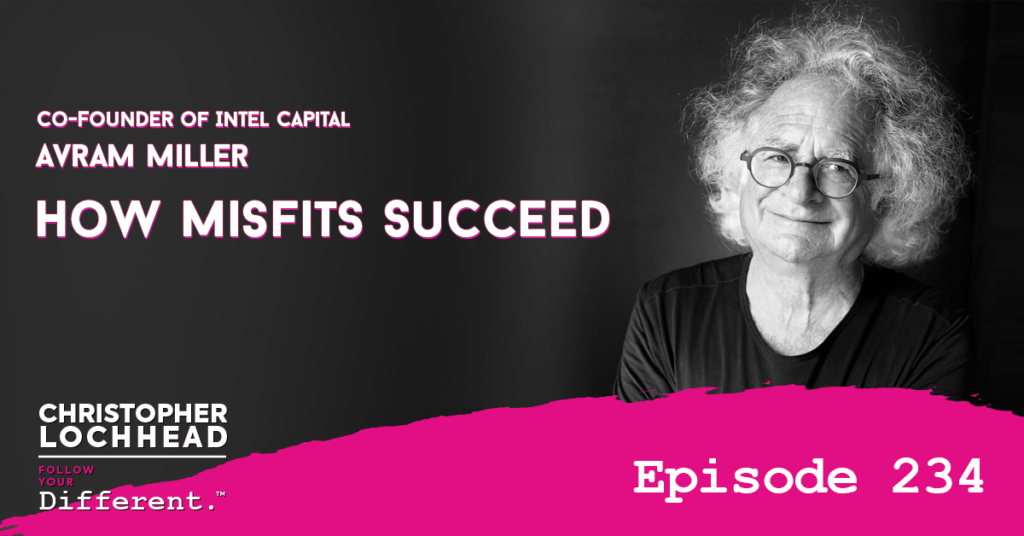
Podcast: Play in new window | Download (Duration: 1:34:07 — 64.6MB) | Embed
Subscribe: Apple Podcasts | Spotify | Pandora | RSS | More
A few companies have had the impact in the technology industry that Intel has had. Without Intel, the personal computer might never have happened the way that it did. In this episode of Follow Your Different, we go inside Intel, and inside the life of one of the tech industry’s true living legends, Avram Miller.
Avram Miller is best known as the co-founder of Intel Capital, the most successful corporate venture group in the history of the technology industry. What Avram and his partners created became the model for corporate venture capital in Silicon Valley. In addition, he’s also famous for spotting and leading Intel’s initiative to create and expand residential broadband internet access.
He’s got a new book out, called Flight of the Wild Duck, and improbably journey through life and technology. So for those who call the Internet your home, stay tuned and have a deep, meaningful, and unedited real dialogue with a true legend.
Avram Miller on Being a ‘Misfit’
When asked about the term ‘misfit’ and what it means for him, Avram shares that for him, it was somebody who wasn’t really right for the system. Though it’s not like that somebody has a problem or is not doing anything, but more of that they couldn’t do what was expected of them.
Which was not to say that he himself was a misfit growing up. Rather, that was how he thought others perceived him. This left him confused and eventually getting the impression that there might be something wrong with him.
Nowadays, he doesn’t get the feeling of being a misfit anymore, though there’s still the notion of feeling like the odd man out.
“I think I still feel like the odd man out. Often, and not so much because of my life today. If I were to be back in my previous life, I would guess I would still feel like I didn’t quite fit in. You know, I was at Intel for 15 years, I achieved a fairly high position at Intel one of the when I was there. And that’s actually kind of what caused me to use the title of my book, which was the Flight of a Wild Duck, which is what Andy Grove, he referred to me as that. But you know, the, the Wild Duck is the duck does not going in the same direction as the other ducks.” – Avram Miller
Life at Intel
Despite all this, Avram did not have any problems working for Intel, and the feeling was mutual. That’s because he has something to give to the company that they needed. So while he doesn’t think he fits in completely, he still had a lot to offer on the table, and Intel valued him for it.
“At Intel, things really based on results. And I had results, I could make things happen. So once I could show that I could make results, once I could achieve things, everything was pretty much okay, because I was judged on my contributions.” – Avram Miller
The Strengths and Weaknesses of Fitting In
That said, he thinks that while these systems are great for finding people that fit, there can also be drawbacks to it. While you can get people that might fit in to your idea of a perfect system, you might miss out on those ‘misfits’ that end up changing the landscape of business.
“Most people go through life, and they go through some system, which was devised in the industrial age. You should think of that process is a funnel that’s filtering out people, it’s filtering out misfits. And at the end, you have people that are really, really good at doing certain things, and no good at doing other things. But those other things are needed. And it’s a strength, because you have all these people that are very, very good at doing certain things, like showing up on time. But it’s a weakness, because they don’t have the creativity, the imagination, the intuition, all this has been filtered out. Either they’ve suppressed it, or the people that had it just didn’t make it through the funnel.” – Avram Miller
To learn more about Avram Miller and his thoughts on how misfits can succeed in the tech world, download and listen to this episode.
Bio
Avram Miller is an American – born businessperson, venture capitalist, scientist, technologist, and musician.
He is best known for his work at Intel, where he served as vice president, co-founded Intel Capital, and led Intel’s successful initiative to create residential broadband.
After leaving Intel, Miller founded the Avram Miller Company, providing strategic advice to technology companies worldwide.
He currently splits his time between Israel and the United States.
He is the author of The Flight of a Wild Duck, an improbable journey through life and technology
Links
Follow Avram today!
Websites:
Twitter: @AvramMiller
LinkedIn: in/Avram
We hope you enjoyed this episode of Follow Your Different™! Christopher loves hearing from his listeners. Feel free to email him, connect on Facebook, Twitter, Instagram, and subscribe on iTunes!
123 The Two Categories of Problems / Opportunities
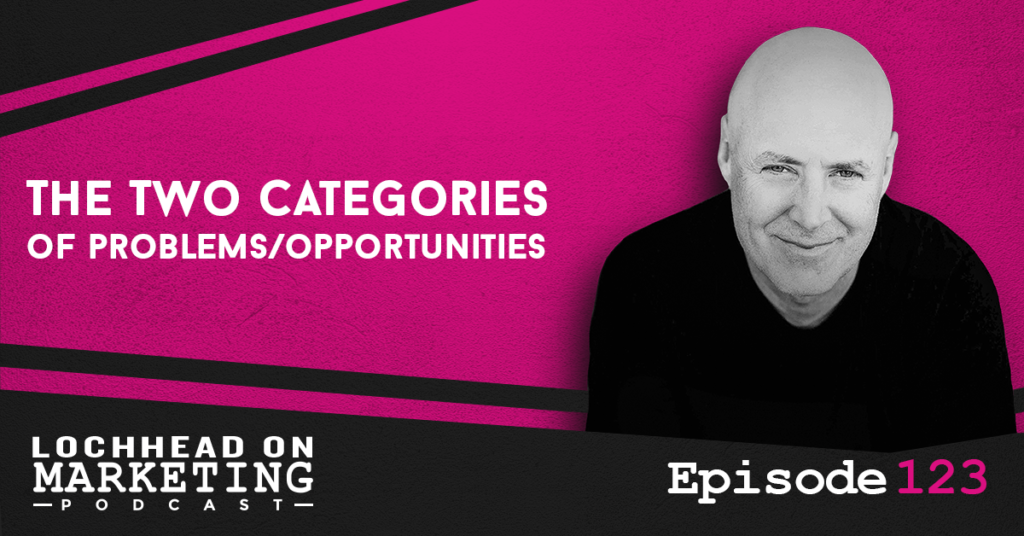
Podcast (lochheadonmarketing): Play in new window | Download (Duration: 5:14 — 3.6MB) | Embed
Subscribe: Apple Podcasts | Spotify | RSS | More
In this episode of Lochhead on Marketing, let’s talk about the two categories of Problems and Opportunities that we face, and the questions that we need to ask to figure out what we’re dealing with when an issue or an opportunity arrives.
Know the Category of Problems / Opportunities First
If you’re a business leader or marketing leader, you’re an entrepreneur. Of course, your job is to deal with problems and opportunities as they arise. So when any new problem or opportunity arises first, let’s think about what is the context of it? What type of problem or opportunity is it?
It turns out there’s really only two big problems that we face. One, knowing what to do and two, doing it. So when an issue, opportunity, or a problem comes up, it is critical that we ask the questions that we need to ask to understand: “Is this a ‘knowing what to do’ problem, or is this a ‘doing it’ problem?”
Most people just jump to problem solving before they know what category of problem they’re solving. Of course, solving a ‘knowing what to do’ problem a.k.a. strategy is very different from solving a ‘doing it’ problem a.k.a. execution.
So the next time something pops up, ask yourself and your colleagues, is this a ‘knowing what to do’ problem or ‘doing it’ problem?
Bio
Christopher Lochhead is a #1 Apple podcaster and #1 Amazon bestselling co-author of books: Niche Down and Play Bigger.
He has been an advisor to over 50 venture-backed startups; a former three-time Silicon Valley public company CMO and an entrepreneur.
Furthermore, he has been called “one of the best minds in marketing” by The Marketing Journal, a “Human Exclamation Point” by Fast Company, a “quasar” by NBA legend Bill Walton and “off-putting to some” by The Economist.
In addition, he served as a chief marketing officer of software juggernaut Mercury Interactive. Hewlett-Packard acquired the company in 2006, for $4.5 billion.
He also co-founded the marketing consulting firm LOCHHEAD; the founding CMO of Internet consulting firm Scient, and served as head of marketing at the CRM software firm Vantive.
We hope you enjoyed this episode of Lochhead on Marketing™! Christopher loves hearing from his listeners. Feel free to email him, connect on Facebook, Twitter, Instagram, and subscribe on Apple Podcast! You may also subscribe to his newsletter, The Difference, for some amazing content.
233 How Ten Global Cities Take On Homelessness with Linda Gibbs & Muzzy Rosenblatt
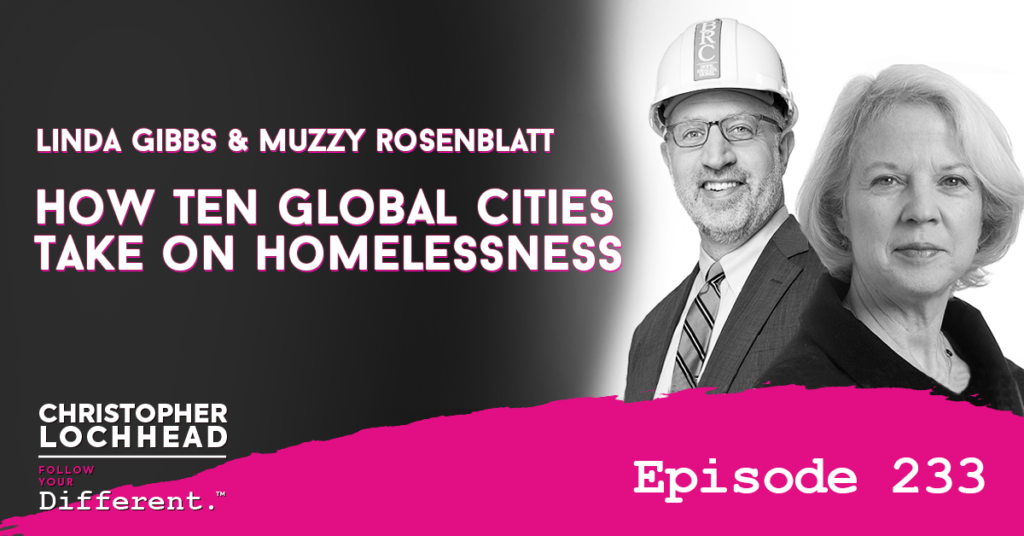
Podcast: Play in new window | Download (Duration: 1:40:54 — 69.3MB) | Embed
Subscribe: Apple Podcasts | Spotify | Pandora | RSS | More
Homelessness is a daunting, heartbreaking, and complex problem. There are currently about half a million Americans experiencing homelessness to this day. So in this episode of Follow Your Different, let’s dig into what we can do to make a difference with our guests Linda Gibbs and Muzzy Rosenblatt, two of the authors of a powerful new book called How 10 Global Cities Take On Homelessness.
Linda Gibbs served as a Deputy Mayor for Health and Human Resources for New York City from 2005 to 2013. During her tenure, New York City was the only top 20 city in America whose poverty rate did not rise. Today, Linda is a principal at Bloomberg Associates, which is a philanthropic consulting arm of Michael Bloomberg’s nonprofit organization. They work with cities globally to make a difference, particularly in areas of homelessness. Also with us is Muzzy Rosenblatt, who is the CEO of BRC, a nonprofit that has worked for 50 years to provide housing and treatment services to homeless adults in New York City.
It’s safe to say that Linda and Muzzy are definitely experts in grappling with homelessness. The insights they share in their book are based on two extraordinary careers that are dedicated on solving the issue of homelessness. So if you have ever been homeless at some point in your life, or know someone who is in this situation, this dialogue is something you will want to hear from start to finish.
Linda Gibbs on Solving the Homelessness Problem
When asked why we can’t seem to solve the homelessness problem, Linda shares that it’s not really a complex problem, but it is hard one to tackle. It doesn’t take a brilliant idea, or a new, innovative solution to solve it. The solution is easily staring us in the face, but we can’t implement them due to certain factors.
One of the reasons is the vast amounts of resources that needs to be allocated to make it happen. You need to have the money to put the basic programs that can help people in motion. Though according to Linda, that’s not even the biggest issue.
“The harder part, quite frankly, is it requires people who work in many different organizations at different levels of government. It requires that they all work together, like a well-oiled machine. The biggest problem is that these different systems, they all have their flaws. Also, many of the systems who have to be working together to fix the problem, are the very systems that generate the problem. And so, getting them to the table and working together toward one unified objective is the biggest challenge by far.” – Linda Gibbs
Linda Gibbs on Why They Care
Before going further with the discussion, we asked both our guests why they people should care about the homeless. Linda shares that this is not something that people choose willingly for themselves. There are multiple factors as to why someone would be homeless. As a community, Linda thinks that we can do better for ourselves and our neighbors, especially those who are in dire need of our help.
“We live in, in many ways, a deeply flawed society, and we have to do better. We have to address the consequences of those flaws. And it’s incumbent on us that we need to fix those flaws, and we need to be committed to the longer-term reforms. Though we also have to address the faults now while we focus on those longer-term strategies.” – Linda Gibbs
Muzzy Rosenblatt on the Importance of Solving Homelessness
Muzzy agrees with Linda’s views, but also recognize that some people might not see the same as them. He would encourage everyone to help, but doesn’t force them to do so.
Though he points out that it can be beneficial for cities to tackle their city’s issue of homelessness instead of just doing temporary measures to alleviate them. For one thing, the money being spent on keeping things in the current status quo is coming from taxpayer’s money, so instead of having a stop gap or a short-term solution, why not solve the problem once and for all?
Also, getting the homeless back into a financially stable condition means more taxpayers and workforce in the long run. Don’t think about it as spending money on the homeless, but rather investing in the future of the city and the community.
If you want to hear more from Linda Gibbs & Muzzy Rosenblatt and their new book, How 10 Global Cities Take On Homelessness, download and listen to this episode.
Bio
Linda Gibbs
Linda Gibbs served as Deputy Mayor for Health and Human Services for New York City from 2005 to 2013.
Supervising the city’s human service, public health and social justice agencies, she spearheaded major initiatives on poverty alleviation, juvenile justice reform and obesity reduction. Two of the collaborative efforts she shaped to address significant social challenges are “Age Friendly NYC,” a blueprint for enhancing the livability of older New Yorkers, and “Young Men’s Initiative,” an initiative addressing race-based disparities facing Black and Latino young men in the areas of health, education, employment training and the justice system. Gibbs also improved the use of data and technology in human service management, contract effectiveness, and evidence-based program development. During her tenure, New York City has been the only top 20 city in the U.S. whose poverty rate did not increase while the national average rose 28%.
Prior to her appointment as Deputy Mayor, Gibbs was Commissioner of the New York City Department of Homeless Services (DHS) and held senior positions with the New York City Administration for Children’s Services and the Mayor’s Office of Management and Budget.
Muzzy Rosenblatt
Muzzy Rosenblatt is the Executive Director of BRC, the Bowery Residents’ Committee, one of New York City’s most comprehensive social services agencies. Through its holistic and individualized approach to service, BRC helps thousands of homeless men and women gain the knowledge and skills they need to help themselves to overcome adversity and dependency; regain their health, mental health and sobriety; restore their self-sufficiency and self-respect.
Since arriving in 2000, Muzzy has led the agency through a period of growth that has strengthened its financial condition, improved the quality of services provided, and established BRC as a leader and innovator among not-for-profit social services agencies.
From 1988 to 1999, he held several positions in New York City government, including First Deputy Commissioner and then Acting Commissioner of the New York City Department of Homeless Services. Among his accomplishments at DHS were the dramatic restructuring of service delivery that transformed a patchwork of city-run custodial shelters into a service-rich residential treatment system operated by nonprofit agencies and the development of evaluative criteria to ensure resources are provided to those in need.
Muzzy received his MPA from the Robert F. Wagner Graduate School of Public Service at New York University (1992), and his BA from Wesleyan University (1987). He is a native New Yorker, and resides in Forest Hills, New York, in the borough of Queens.
Links
Follow Linda and Muzzy today!
Linda Gibbs
Twitter: @BloombergAssoc
Muzzy Rosenblatt
LinkedIn: in/Muzzy-Rosenblatt
More on their new book:
Amazon: How Global Cities Take On Homelessness
University of California Press
We hope you enjoyed this episode of Follow Your Different™! Christopher loves hearing from his listeners. Feel free to email him, connect on Facebook, Twitter, Instagram, and subscribe on iTunes!
122 How To Create A Successful Newsletter On Substack (Or Anywhere Else)
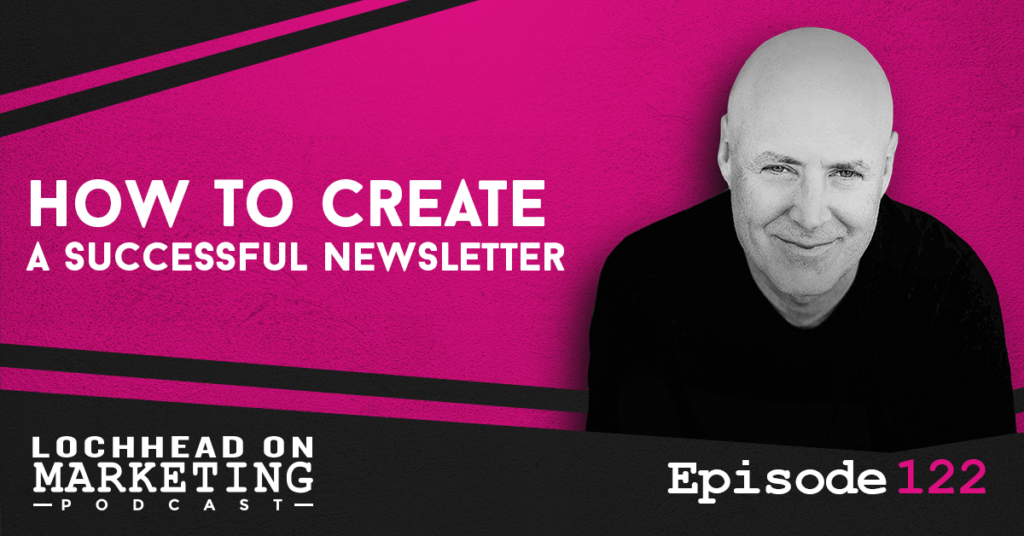
Podcast (lochheadonmarketing): Play in new window | Download (Duration: 16:36 — 11.4MB) | Embed
Subscribe: Apple Podcasts | Spotify | RSS | More
In this episode of Lochhead on Marketing, let’s talk about newsletters. Particularly, how to create a successful newsletter.
Lately, we’ve been getting a lot of questions regarding newsletters: how to create a successful newsletter. With the success we are having on Category Pirates, I would like to share some of my thoughts on how you can create a successful newsletter yourself.
It Is Never Too Late
One of the things you’ll hear when you express the intent to create a newsletter (or podcast for that matter) is that there are already a million other newsletters and podcasts out there. If you hear this statement, stop listening, and continue on.
Just because someone is already doing well in a field you are attempting to be in, doesn’t mean you don’t do it anymore. It just means you have to take a different approach on getting to the top.
The other premise that keeps being pushed around is that people don’t want to read long newsletters. They want soundbites, or easily digestible tidbits of information. Well, we reject that premise, and sought to create a newsletter that we ourselves would want to read.
It turns out, other business leaders also love reading it.
How to Create a Successful Newsletter
That said, here are some tips on how you can write your own successful newsletter.
- Have a different point of view. It’s astounding how much stuff out there is just a regurgitation of the same thing. Figure out what makes you unique, make that true north, and stick to it.
- Bring fresh data, frameworks, and insights. Some people just tend to recycle other people’s data and call it “research”. If you want to be a successful, differentiated newsletter writer, do your own primary data research.
- Write with courage.
- Don’t write anything that is already being written. When something popular is going on, everyone wants to have a hot take on it to ride along the wave. But if everyone is already writing about the same stuff, why would you write about the same thing?
- Don’t “curate” recycled stupidities. If you want to include other people’s work in your newsletter, that’s fine. As long as you make sure what you’re curating is high-quality content.
- Write tight.
- Don’t write anything you’d see in tier-2 magazines. If your content consists of clickbait-y topics and other nonsense, then how are you different from the hundreds of other clickbait websites out there? You will just be another carbon copy of the same thing.
- Know who you’re NOT writing for. It is important to know who your audience is. Although, it’s equally important, if not more, to know who you are NOT writing for. Because the worst thing you can do is listen to the wrong crowd.
- Keep your eye on the ball, not the audience. Don’t obsess about subscriber counts, social media metrics, etc. If you have too little subscribers, it will just bum you out. If you suddenly have an influx of subscribers, it might affect your decision-making and quality of your content.
- Write every day, regardless of how often you publish. You’ll be amazed on how much ideas can come out of the blue. Don’t waste them; write it all down. Also, it will help you improve your writing skills if you put it to practice daily.
- Don’t listen to anyone who tells you the newsletter category is saturated and therefore you shouldn’t do it.
- If you want smart readers, write smart. There’s a difference on writing it so it’s understandable by a huge audience, and dumbing it down to appease the mouth breathers.
- Do work YOU think is legendary. Minimum viable newsletter is as dumb as it sounds. If you’re going to do something, make it legendary.
And here’s a bonus one for the road:
- Don’t be marketing your shit all the time. This is a big turnoff for a lot of readers, especially those who are looking for informative content. A shoutout or two once in a while is good, but don’t make a habit of it.
Bio
Christopher Lochhead is a #1 Apple podcaster and #1 Amazon bestselling co-author of books: Niche Down and Play Bigger.
He has been an advisor to over 50 venture-backed startups; a former three-time Silicon Valley public company CMO and an entrepreneur.
Furthermore, he has been called “one of the best minds in marketing” by The Marketing Journal, a “Human Exclamation Point” by Fast Company, a “quasar” by NBA legend Bill Walton and “off-putting to some” by The Economist.
In addition, he served as a chief marketing officer of software juggernaut Mercury Interactive. Hewlett-Packard acquired the company in 2006, for $4.5 billion.
He also co-founded the marketing consulting firm LOCHHEAD; the founding CMO of Internet consulting firm Scient, and served as head of marketing at the CRM software firm Vantive.
We hope you enjoyed this episode of Lochhead on Marketing™! Christopher loves hearing from his listeners. Feel free to email him, connect on Facebook, Twitter, Instagram, and subscribe on Apple Podcast! You may also subscribe to his newsletter, The Difference, for some amazing content.
232 How To Create The Future with Martin “Marty” Cooper, Father of the Cell Phone
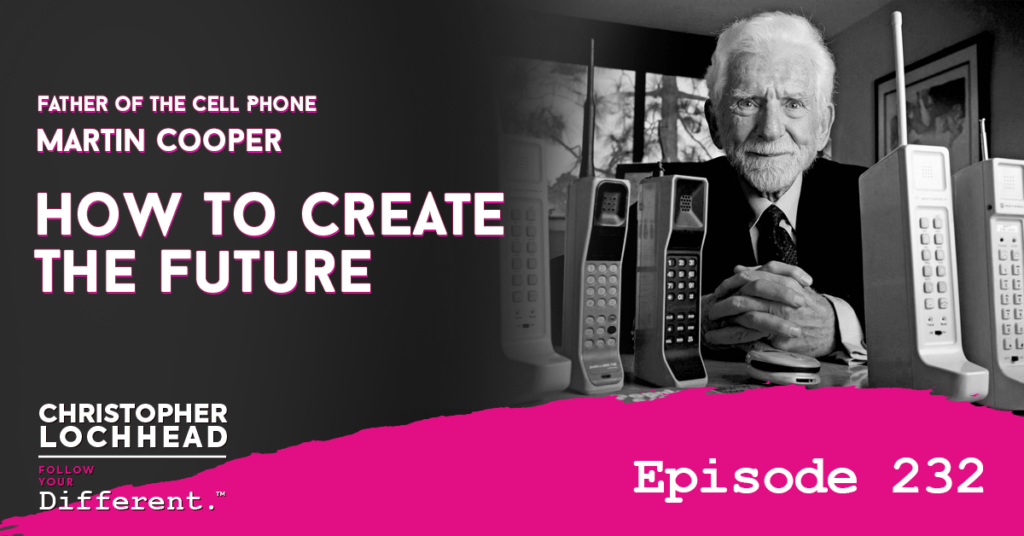
Podcast: Play in new window | Download (Duration: 1:24:08 — 57.8MB) | Embed
Subscribe: Apple Podcasts | Spotify | Pandora | RSS | More
In this incredibly special episode of Follow Your Different, we have a person that is like no other that has ever been on this podcast. We know the names of many of the legendary innovators and category creators of the modern era: people like Henry Ford, Steve Jobs, Bill Gates, Elon Musk, and many others are rightfully celebrated worldwide. Yet most people don’t know who the father of the cell phone is. The man behind it all is Martin Cooper, and he is our guest for today.
In the last 100 years, there is no category of technological breakthrough more important than the cell phone. While there are others that are equally important, it is not an exaggeration to say that the mobile phone changed the trajectory of humanity. The cell phone created a radically different future that has created and it continues to create exponential benefits for humankind.
I’m very grateful that Marty took the time to write his new riveting book, it’s called Cutting the Cord. Because now, we have a first-person account of the life and the learnings of a legendary innovator, engineer, and category creator, and frankly, American, Martin “Marty” Cooper.
What follows is an unedited, uninterrupted conversation with Martin Cooper. We cover everything from his definition of what technology is, to why he’s irked by how the mobile companies have rolled out 5G. We also talk about his thoughts on how to bridge the digital divide and how to bring the internet to everyone, which he is really passionate about.
So if you want to hear more from the Father of the Cellular Phone himself, stay tuned to this episode.
Martin Cooper on Bridging the Digital Divide
When asked about his current thoughts on technology, Marty’s initial thoughts were on the digital divide with regards to education. Particularly, it’s due to the fact that people cannot get a decent education in modern times without having access to the internet. One reason is that having access to the internet means having access to anything all the time. You also have access to all the knowledge of society at your fingertips.
Unfortunately, that access is only afforded to half the students nowadays, even in an advanced country like the United States. Others either have no access to it because of the cost, while some have no decent service available to them at all. For Marty, the idea is simply ridiculous, especially during this day.
“There is no technological reason for that to be the case. The carriers that provide us with service, people like AT&T, T Mobile, Verizon, and many other carriers license the radio spectrum from us. Their licenses have one basic requirement: and that is that the use of the spectrum should be in the public interest and convenience. And yet, there we have it 25% of our country is not covered, and 25% of our population can’t afford the service.” – Martin Cooper
Some of Marty’s suggestion regarding the matter is to make it more accessible to the public, either by lowering rates, or building a system where its almost a necessity for each household to have such a connection. Even if it means having the government shoulder the cost. Because the alternative is having a population where half of it is being left behind in terms of education.
Martin Cooper on 5G
For Marty, 5G doesn’t really affect the average consumer. It is mostly targeted on businesses, companies, and other structures of that nature. What irks him about this is how they are promoting it, saying that they will be useful to industries such as autonomous cars and remote surgery.
The main thing about those two examples is that it’s not only fast connection that will enable it to be effective. You also need a network where it can operate at very low latency, so that reaction times will be instantaneous. It would be bad if two autonomous cars that are about to crash to have a few seconds delay on their response. You definitely do not want a doctor doing a crucial operation on someone being hampered by lag.
“I think the FCC should be taking some action to either get the carriers to fill this gap in their service, or let other people come in and do it via the radio spectrum.” – Martin Cooper
Cutting the Cord
Marty pointed out that nowadays, there are more cell phones out there than people. This is because most people have at least one phone, and there are some who have multiple mobile devices on them. This indicates that a lot of people are naturally mobile, though that might not be the case during this time. The point is, these phones and other mobile devices are being used daily to do pretty much everything in the society nowadays.
Yet when you talk to politicians about giving access to everyone, their go-to response is still to provide cable service. The problem with this is that wired telephone is a thing of the past, and it is slowly being phased out even by the cable companies they tout.
“In the United States, there are only less than 60,000 wired telephone left, yet there are more cell phones and people. So the answer is that somehow, we have to provide wireless access to everybody, for all of the services, and the most essential service today is education.” – Martin Cooper
To hear more from Martin “Marty” Cooper and his thoughts on the future of technology and bridging the digital divide, download and listen to this episode.
Bio
Martin Cooper is an engineer, inventor, entrepreneur, and futurist. He is known as the “father of the cell phone.” He led the creation of the world’s first cell phone at Motorola—and made the first public call on it. Over nearly three decades at Motorola, Cooper contributed to the development of pagers, two-way radio dispatch systems, quartz crystal manufacture, and more.
A serial entrepreneur, he and his wife, Arlene Harris, have cofounded numerous wireless technology companies. This includes Cellular Business Systems, SOS Wireless Communications, GreatCall, and ArrayComm. Cooper is currently chairman of Dyna LLC and a member of the FCC’s Technological Advisory Council. He was the first to observe the Law of Spectrum Capacity, which became known as Cooper’s Law.
In 2013, Cooper became a member of the National Academy of Engineering from whom he received the Charles Stark Draper Prize for Engineering. He was awarded the Marconi Prize “for being a wireless visionary who reshaped the concept of mobile communication.” He has been inducted into the Consumer Electronics Hall of Fame and Wireless History Foundation’s Wireless Hall of Fame. The Radio Club of America awarded him a Lifetime Achievement Award in 2010. He is a lifetime member of the IEEE, was president of its Vehicular Technology Society and received its Centennial Medal. In 2007, Time magazine named him one of the “100 Best Inventors in History.” He is a Prince of Asturias Laureate.
Cooper grew up in Chicago, the son of Ukrainian immigrants. He attended Crane Technical High School and the Illinois Institute of Technology, where he is a Life Trustee. He served in the US navy as a submarine officer during the Korean Conflict.
Links
Follow Marty today!
LinkedIn: in/MartinCooper4
Twitter: @MartyMobile
Check out his book: Cutting The Cord
More on Martin Cooper:
Meet the Inventor of the First Cell Phone
CBS 60 Minutes – The Cell Phone: Marty Cooper’s Big Idea
We hope you enjoyed this episode of Follow Your Different™! Christopher loves hearing from his listeners. Feel free to email him, connect on Facebook, Twitter, Instagram, and subscribe on iTunes!
121 How to be more creative (Inspired By bestseller “Two Beats Ahead” By Panos Panay & R. Michael Hendrix)
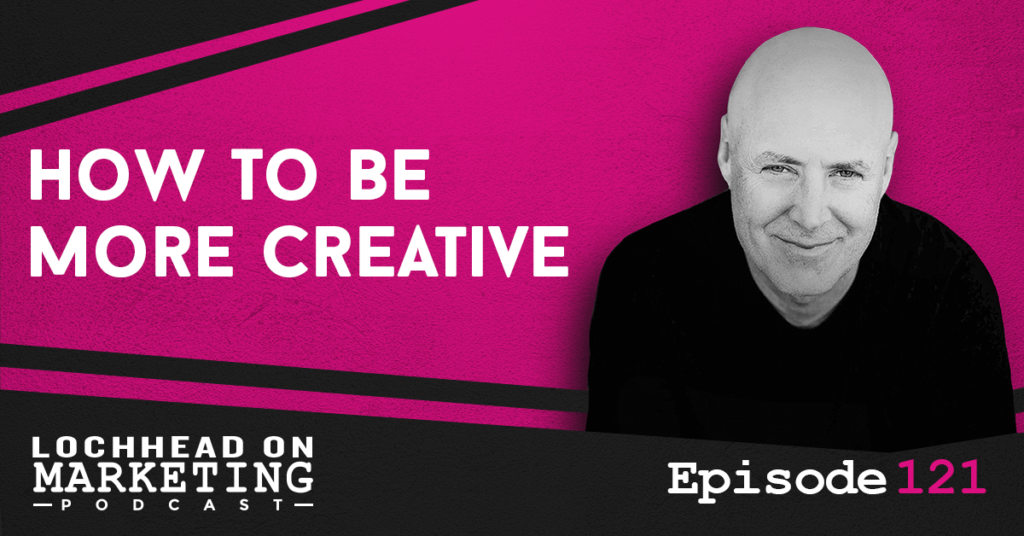
Podcast (lochheadonmarketing): Play in new window | Download (Duration: 13:01 — 8.9MB) | Embed
Subscribe: Apple Podcasts | Spotify | RSS | More
In this episode of Lochhead on Marketing, let’s talk about how to be more creative and two beats ahead of the rest.
I’ve been inspired of late by a new book called Two Beats Ahead by Panos Panay and Michael Hendrix. What I love about this book is these guys are musicians who teach entrepreneurship and how to have an entrepreneurial mind in the musical world, so to speak. This book is about how to take some of the big creating learnings from some of the greatest music artists in the world and apply them in a business context.
If you want to hear more from them, check out this episode of Follow Your Different (FYD episode 218) or get Two Beats Ahead here.
Though for this one, I wanted to focus on the ideas that have been rattling around in my head and in my conversations with marketers and entrepreneurs. So if you want to hear more about it, stay tuned to this episode.
Two Beats Ahead
If you haven’t listened to our conversation at Follow Your Different, you are really missing out. Panos Panay and Michael Hendrix are amazing people, and our conversation about the book and their thoughts on business is legendary.
One of the things we talked about in the books is that they ask a question. When they do workshops, they ask the CEOs, “who would you rather hire, an athlete or a musician?” I thought this was an interesting question, because musicians, particularly ones that write their own music, usually have a high degree of creativity.
Three Takeaways
There are three big ideas I wanted you to take away from how I’ve been taking the learnings from Michael and Panos.
Dare To Suck
The first comes from a quote from Justin Timberlake in the book: “ I only have one rule in the studio, and that’s this: dare to suck.”
I think when many of us are in business jam sessions, whether we are thinking about products or marketing campaigns or new business models and whatnot, we’re in some kind of jam session with a group of people. Our objective is to do some thinking out loud and be creative. Though what tends to happen in these sessions is not about being creative, innovative, and coming up with legendary ideas. It can often be sort of about posturing, looking good, currying favor with the boss, or something along those lines.
I think it’s best to not worry about those things and dare to suck. Let ourselves be free and be open. Don’t worry about what we look and take Justin’s advice: Dare to suck.
Collaboration
As you read through the book, it is painfully obvious that legendary musicians collaborate in a way that is unusual, to say the least. Here’s a quote from the book:
“The company that operates more like a band of collaborators than a strict corporate hierarchy has the ability to shape an environment where everyone feels a sense of belonging.” – Two Beats Ahead
As someone who collaborates with two highly creative people in Category Pirates, having a highly intense and creative environment multiple times a week as we work on the newsletter has been an amazing experience. When you have a group of people who are committed to doing legendary work, who are willing to suck, and willing to jam with each other like a band would, it can be quite rewarding for everyone involved.
The opportunity to be playful and truly collaborative and not give a shit about sucking or how we look is a very freeing thing in business.
Keep Creating, Not Editing
One of the things mentioned in the book is that musicians just keep creating. When they get into a creative zone, they just keep going and not worry about editing it. The time for editing comes later.
I think that’s remarkable as when you think about it, when you have a creative jam session in business, a lot of the time is spent on editing rather than creating. Whenever someone comes up with a new idea, it’s either immediately criticized or shut down. It’s rare that an idea is allowed to be built up by the person who mentioned it or someone else in the session.
So the AHA here is just let the creating keep happening, play a game called “What’s Possible”. I also ask questions like, “If we were legendary, what would we do here?”, or “If we were smart and we were us, what might we do here?” Because we’re definitely us.
Another question I love is what are the headwinds and tailwinds, and how do we harness both to our great advantage?
That said, the main point is to not edit: just keep creating. We over edit and under create in the business world. Let’s be more like legendary musicians and create like crazy and edit later on.
These three takeaways I think are very, very powerful. This book has sort of swiveled around in my head and let me play with these ideas. Hopefully you take a look at the book and have your own takeaways on it as well.
Bio
Christopher Lochhead is a #1 Apple podcaster and #1 Amazon bestselling co-author of books: Niche Down and Play Bigger.
He has been an advisor to over 50 venture-backed startups; a former three-time Silicon Valley public company CMO and an entrepreneur.
Furthermore, he has been called “one of the best minds in marketing” by The Marketing Journal, a “Human Exclamation Point” by Fast Company, a “quasar” by NBA legend Bill Walton and “off-putting to some” by The Economist.
In addition, he served as a chief marketing officer of software juggernaut Mercury Interactive. Hewlett-Packard acquired the company in 2006, for $4.5 billion.
He also co-founded the marketing consulting firm LOCHHEAD; the founding CMO of Internet consulting firm Scient, and served as head of marketing at the CRM software firm Vantive.
We hope you enjoyed this episode of Lochhead on Marketing™! Christopher loves hearing from his listeners. Feel free to email him, connect on Facebook, Twitter, Instagram, and subscribe on Apple Podcast! You may also subscribe to his newsletter, The Difference, for some amazing content.
231 The Science and Technology of Growing Young with Sergey Young
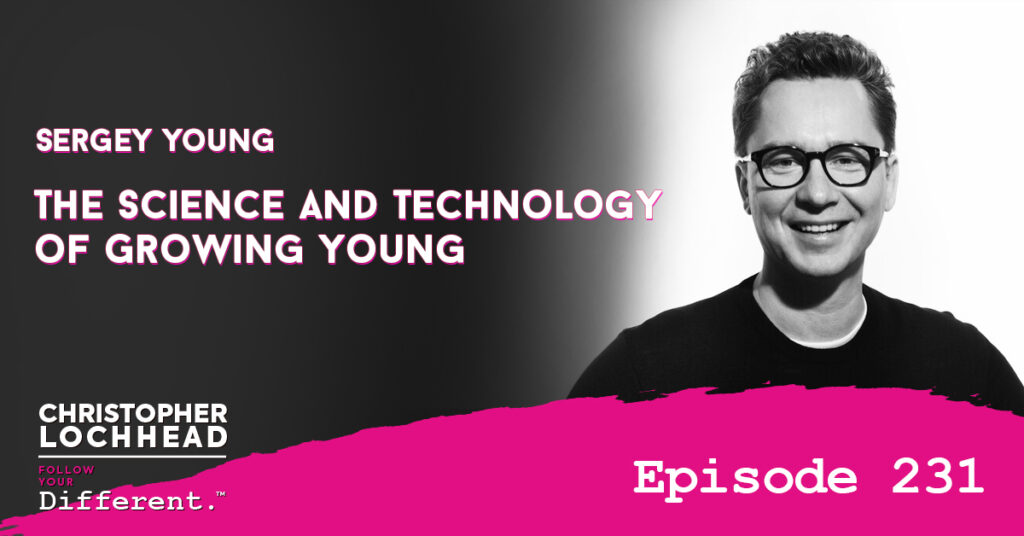
Podcast: Play in new window | Download (Duration: 1:27:20 — 60.0MB) | Embed
Subscribe: Apple Podcasts | Spotify | Pandora | RSS | More
In this episode of Follow Your Different, we’ll have a dialogue that just might change how you think about aging, and maybe even life itself. Who better to have this dialogue than with Sergey Young, author of the book called The Science and Technology of Growing Young.
Sergey believes that entrepreneurs and startups are already creating the longevity, technology, and category breakthroughs needed to design a new category of human that lives to 200 and beyond. He also believes that people in the future will have a health span well past 150, and that most of us living right now can get to 120.
We dig deep into this new into what’s happening in this new mega category of longevity. We also talk about what Sergey calls the near and far horizons of longevity breakthroughs, and how the conversion of bio and tech is already saving and extending lives.
The Science and Technology of Growing Young
Sergey talks about the journey on writing his book, The Science and Technology of Growing Young. He misses it so much that he’s already thinking about his next book, which will be as legendary as the current one.
When asked about any particular topic in the book that he wanted to discuss, Sergey points to the last chapter, which talked about the morality of immortality. The reason for this is that his publisher thinks that the last chapter deserved its own book. To which Sergey responded:
“My response was like, each chapter in the Growing Young book deserves to be a separate book. Because human health, happiness, or desire to live longer is such a complex subject. So you can do like 1000 books on the back of that.” – Sergey Young
Sergey Young on the Morality of Immortality
Following up on the publisher’s comment, Sergey believes that the morality of immortality is probably the most contentious topic, because it is always very shocking. He shared that most polls, depending on the country, have 60 to 80 percent of the people saying no to life extension.
“I was always surprised why. And what I learned is, we have created the science and technology to extend our lives. But we haven’t created life that we want to extend.” – Sergey Young
This is because when most people hear about longevity of life, they think it’s just to extend their lives for 5-10 years. Though in this case, Sergey’s book discusses working on healthspan, and not necessarily lifespan.
“What I want to do is to insert another 20 to 25 years, right in the middle of your life cycle, to give you more time on Earth, to be with your loved ones, to realize your dreams, to change your career, and to have kids from multiple generations.” – Sergey Young
Sergey Young on Virtual Avatars
Sergey then talks about virtual avatars, and what he thinks will be a good use for it in the future.
He shares that he misses his conversations with his grandfather, and would give anything to be able to talk to him again. Virtual Avatars could be a way to have such moments with your love ones, even as they have moved on.
“I’m actually expecting this with a weird combination of excitement and fear. At the same time, like many of us, I always try to think about the application of this new technologies, which sounds scary. But if applied in the right person at the right time, they actually doing a lot of good things.” – Sergey Young
Sergey also mentions Elon Musk and the research on neuro link. While some people think this is really against human nature, it might eventually be helpful to those suffering from neuro-genetic diseases. Also, being able to integrate with computers mean that we can explore more depths and harsher environments without sacrificing human life.
If you want to hear more from Sergey Young and his thoughts on how to grow young, download and listen to this episode.
Bio
Sergey Young is a longevity investor and visionary on a mission to extend healthy lifespans of one billion people. To do that, Sergey founded Longevity Vision Fund to accelerate life extension technological breakthroughs and to make longevity affordable and accessible to all.
Sergey is on the Board of Directors of the American Federation of Aging Research (AFAR), and is a co-sponsor of the AGE REVERSAL Prize Design. Once ultimately launched, this XPRIZE aims to dramatically delay the biological aging process through widely available interventions that extend the human life and health span.
Sergey Young has been featured as a top longevity expert and contributor on CNN, BBC, Fox News, and Forbes. As the author of books such as ‘The Science and Technology of Growing Young’ and the mastermind behind the online life extension platform SergeyYoung.com, Sergey is passionate about sharing news from the exciting world of longevity.
Links
Follow Sergey today!
Website: SergeyYoung.com
LinkedIn: in/SergeyYoung
Get the book: The Science and Technology of Growing Young
We hope you enjoyed this episode of Follow Your Different™! Christopher loves hearing from his listeners. Feel free to email him, connect on Facebook, Twitter, Instagram, and subscribe on iTunes!

